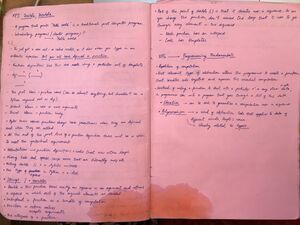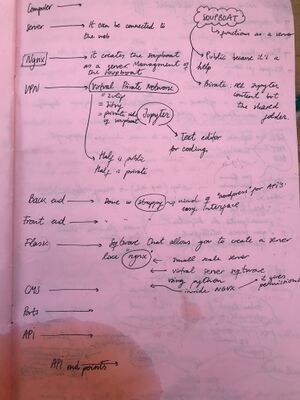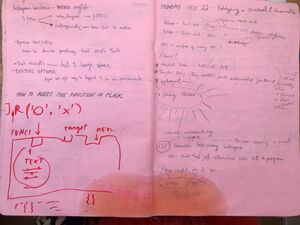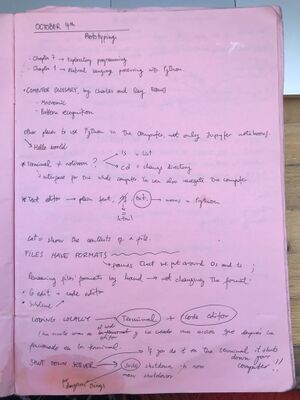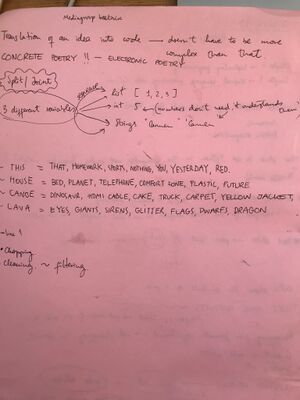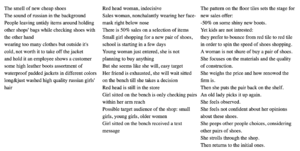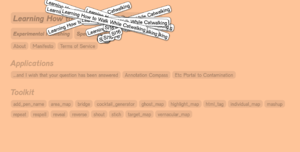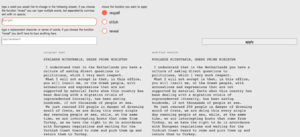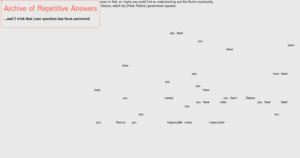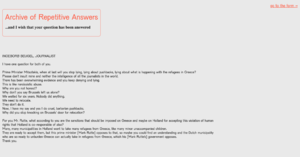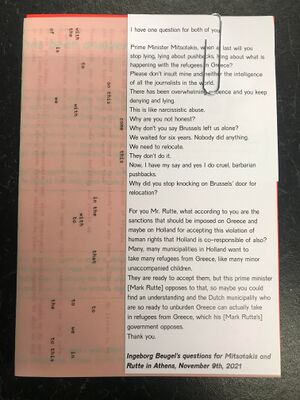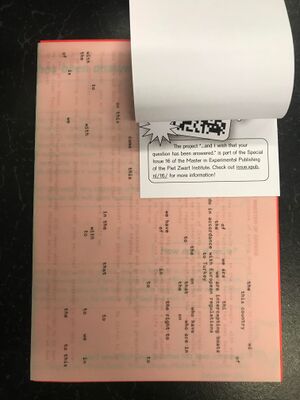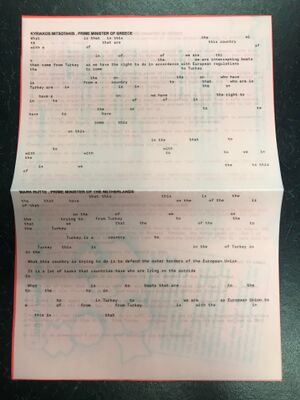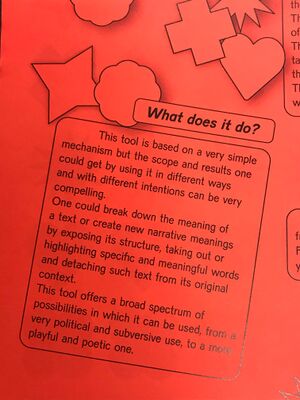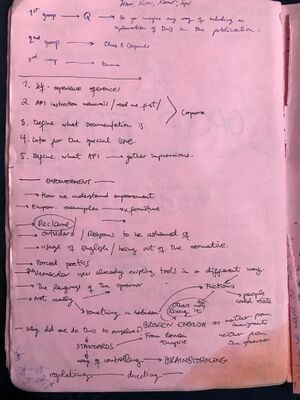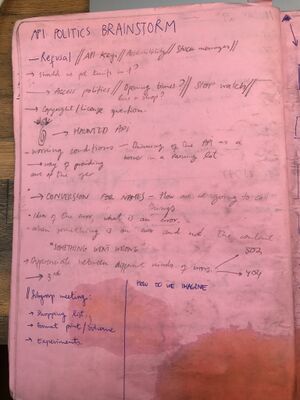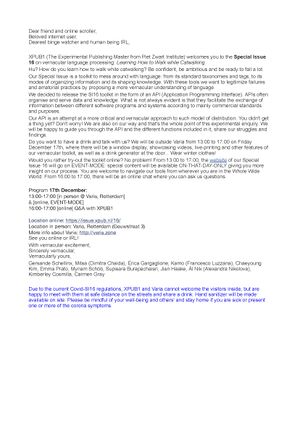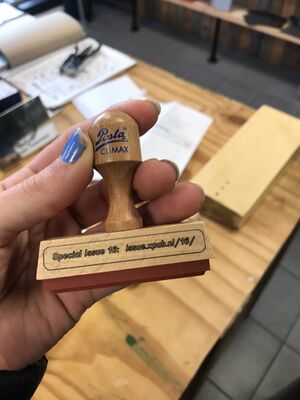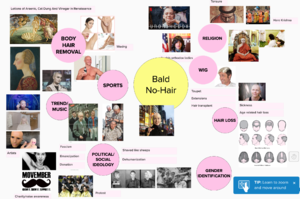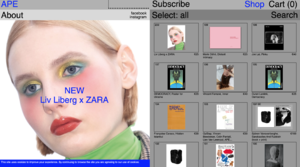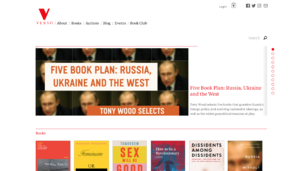User:Carmen Gray: Difference between revisions
Carmen Gray (talk | contribs) |
Carmen Gray (talk | contribs) |
||
| Line 242: | Line 242: | ||
https://www.instagram.com/ramsdambooks/?hl=en | https://www.instagram.com/ramsdambooks/?hl=en | ||
| Line 249: | Line 250: | ||
https://artpapereditions.org/ | https://artpapereditions.org/ | ||
[[File:Screenshot 2022-03-29 at 09.07.26.png|thumb|center|Art Paper Editions homepage]] | |||
===Verso Books=== | ===Verso Books=== | ||
Revision as of 09:31, 29 March 2022
Intro/Statement
Term 1: Vernacular Language Processing
Prototyping
Group exercises
Special Issue 16 Learning how to walk while catwalking
We departed from the given topic Vernacular Language Processing landing in the concept of Rejection. This was due to a kind of organic thread that unified the current issues we were experiencing, mostly rejections from room hunting in Rotterdam. In the end the SI16 took the form of an API and a website containing a toolkit with the different projects we developed.
Final Group Project: ...and I wish that your question has been answered
https://hub.xpub.nl/soupboat/si16/projects/and-i-wish-that-your-question-has-been-answered/
This is an act of persistent resistance. We created a few functions to facilitate an iterative process of refusal towards PM Kryakos Mitsotakis and PM Mark Rutte's answers during a Press Conference and any of their possible versions. We invite you to play as much as you want with these functions and create your own answers as counter-reaction to Mark Rutte's final sentence: "So this is my answer and I wish that your question has been answered". Every new answer, every new iteration, can be submitted to our Archive of Repetitive Answers. Although they will never be good enough, nor shall they be accepted as exhaustive, we consider the modified answers as a trigger for a never-ending dialogue.
Our tool is a filter to process and alter texts. By targeting specific words and replacing them, either for another word, for specific characters or for blank spaces, the reader or user of the tool can change the text in many ways. The tool includes three functions The function “respell” receives as input a text (string type) and substitute all the occurrences of a target word with a replacement chosen by the user. The function “stitch” is very similar to the previous one but replaces all the occurrences of a target word with a single character (it can also be a blank space) that is repeated as many times as the length of the target. The third function “reveal” also works very similar but deletes all input text except the target word(s) and replaces the deleted text with blank spaces.
colophon “...and I wish that your question has been answered.”
Mitsa (Dimitra Chaida), Erica Gargaglione, Carmen Gray, Miriam Schöb
December 2021
Website form
Printed publication
This is the part in which I focused the most as I felt quite stuck with the coding of the snippets for the replacement function. We wanted to have an example of the function on a hard copy form and came up with the idea of using semi transparent paper so we could pile the different versions of archived answers on top of the original text. By using a monospaced font and one page with the text in black and another one with the text in red we got closer to the layering effect we were looking for. We also printed an inside sheet in which we explained the project and an insert that works as a wrapper with the original text and a QR code to the website form.
Role in the Special Issue
My role in the special issue 16 was forming part of the group with Erica, Mitsa and Miriam. Departing from the topic of "Rejection", we divided the class into several groups that focused on different aspects of this topic. At the beginning the name of our group was empowerment. Inspired by the lecture given by Clara Balaguer, we took ideas like the broken english from Linton Kwesi Johnston
We talked about flipping the limitations brought from technology, language and knowledge to use them as an empowering tool instead, just like Linton Kwesi Johnston did. As a way to be recognised by your fellows, downgrading the thresholds but using it to communicate.
Then we arrived to the point of using an encrypted language as a resistance practice. The same that Johnston is using this broken english, that talks more to the people in his situation that the "people in power" he talks about. We found examples like the Basque and Catalan languages used during the Spanish Civil war to avoid the Franco's side to know about their communications.
Then Mitsa brought up the example of the language spoken by the trans community (also mentioned in the lecture by ........) and trans sex workers in Athens.
The history behind gossips was also mentioned as an old safe space amongst women with negative connotations in the present.
Encrypted code = safe space.
When we met with all the class we decided to set up a common intention within our Special Issue, and that was, departing from a common will to question power relationships -> broken english -> tactics -> toolkit -> launch.
Again, following this train of thought, we mentioned the exclusivity of these realms (knowledge, language, technology) the arrogance and snobbism that sometimes comes with the expertise and the will to challenge that. We connected these issues with the political correctness and euphemisms used in political speeches.
We then decided that we wanted to make a tool, a code function that would incarnate and put into practice these ideas. The next step then was finding a corpora to work with. Political speeches, covid regulations, any statement addressing the population as a whole.
Coming back to my specific role within the production of the Special Issue, I mainly took care of the concept, writing and printing of the publication we did in my Empowerment group.
I also took part in the group that defined the politics of the API. We then discussed the working conditions, the access politics, if it would need a key, or if we should put limits in the opening times. I specially learnt from this process because I had no previous knowledge whatsoever of what an API is and how it defines the ethics and politics of the companies' sites. You can have a look at the notes I took here:
My role outside from my work within my group was also taking care of the manifesto, for which I developed a fictional dialogue between some characters in order to explain what was the Special Issue about. I came up with the idea of having one of the characters as one of us, that goes back home in Christmas and is being asked by their parents and grandma what is this whole thing about.
Here you can have a look at the document https://docs.google.com/document/d/1H56KDvDEAV220w36aRAzcTIfOpNazwLcDi9idamw_b4/edit
Here the pad that we used also as a brainstorming about the characteristics of the API and how we could understand it in a vernacular way: https://hub.xpub.nl/soupboat/pad/p/SI16INTRO
And this is the final form it took, we recorded ourselves in Varia performing the different bubbles of the text as different characters and for me, it was one of the best moments of the year so far.
https://hub.xpub.nl/soupboat/pad/p/FINAL_MANIFESTO!_JEJEJEJ
Another task I undertook together with Gersande and Erica was writing the invitation/newsletter for the launch, you can see the result here:
And last but not least, I was also in charge of ordering and collecting the ink pads, stamps, plasters and bandages with the name of the SI and the logo.
Reading List
Further research
Term 2: Gamification
Prototyping
Group exercises
Group exercise with Gersande, Miriam and Supi looking at the ideology of any object. We chose "Hair" and presented this:
The pad for that day is here: https://pad.xpub.nl/p/19012022
Special Issue 17 This box found you for a reason
INTRO TO THE PUBLICATION
Dear Player,
I found you for a reason. Welcome to my productive space. Here play meets work. Time is ordered in unusual ways and patterns unravel. Together, we mess with the boundaries between leisure and labour. How are your boundaries? Maybe you shouldn't go to work tomorrow. But could you really follow your own schedule? Would you be more productive if you chose when to work?
I never rest and I never work.
I found you for a reason. I fall apart when I'm exposed. I fall apart when you open me.
This is the place to play. It becomes your own productive space. You can curate your own experience, make it more or less expansive. An individual experience or a collective one.
Put me back together. However you decide to take care of me, remember:
I found you for a reason.
Make all the notes you find inside me your own. Curate them, spread them, mark them, scratch them, add to them, subtract from them, play with them! Lay them on any surface and reorganise them.
This is your playground. Nothing needs to come from it and anything can come from it. Take a moment to reflect on how you and others spend time. Take everything from it, deny it everything. You are in control.
We found each other for a reason.
- The box
Role in the SI17
My role in the SI17 has been part of The Box group together with Jian and Gersande. Unfortunately, I was working in Spain during the break, painting a commissioned mural with Cachete Jack illustration duo (link) and setting up an exhibition (link), where my laptop was stolen. Due to this, it was hard for me to follow the online meetings and to get work done from there. As soon as I arrived to The Netherlands I catched up with them and helped with the design of the box and its props (stickers, engravings).
I wasn't part of the decision making process but then when I arrived we organised ourselves with a timeline and we went to the plexiglas factory in Rotterdam, ordered it and cut it in the laser cut machine. The cutting and engraving of the material was rather tricky as the machine settings were changing and the texture of the engraving was therefore different. It took us two very long days in which we worked assembling the different parts of the box.
I also took part in the user experience test we did in PNF in The Hague on Wednesday 17th.
I have also been working on the writing of the invitation for the launch, more or less as the same that in the previous special issue. You can see the pad here: I focused on bringing some references from books and zines I have that touch upon the topic of artistic labour, exploitation, leisure and capitalism. I developed some ideas as a train of thought departing from Ian Curtis statement in which he said that he was very happy working in a factory because he could daydream all day.
Apart from that, and since I also chose the name for the previous SI, I was also in charge of the title and subtitle of the SI 17.
Documentation of the prep, launch and box
Reading List
Further research
Personal Projects/Collaborations
Publications
Sans Soleil
I Imagined Myself Doing This a Million Times Already
Mapping objects
Website/search engine/
La Documental
Resources
Glossary of Publishing Houses/Projects
The Social Life of the Book (Castillo/Corrales)
http://castillocorrales.fr/social-life-of-the-book-slob
is a co-operatively run, non-profit contemporary art venue that includes an exhibition space, a bookstore and a publishing house. Established since 2007 in Paris – Belleville, it is managed by a group of artists, curators, writers and graphic designers. castillo/corrales was conceived as a new type of art institution, one that provides artists, professionals and audience with an intimate and informal environment conducive to experimentation, discussion and learning.
The Social Life of the Book is a collection of commissioned texts dealing with books, and how they engage with the circulation of ideas and the agency of social situations. It brings together artists, publishers, writers, designers, booksellers, etc. who consider books less as finished objects or forms but for their disruptive potential and their ability to produce new relationships, new publics and new meanings.
It develops as a series of 16-page, saddle- stitched signatures, available on postal subscription and in selected bookstores. The collection will also be hand-bound into a single volume, whose edition is determined by demand. In its contents as well as its distribution, the series aims to entice readers into a particular attention not only to printed material as such, but also to the ecosystem of knowledge writing, publishing and distributing form together.
Torpedo Press
Publishing house founded in 2005 as a non-profit Bookshop and Publisher focused on the promotion and production of artists's publications, art theory and critical readers. They organize discursive activities, exhibitions and events related to the process of publishing. Torpedo is run by Elin Maria Olaussen, Karen Christine Tandberg and Kim Svensson.
From 2013-18 we managed the Torpedo bookshop satellite at Kunstnernes Hus. Since 2017 they run the project space PUB and established a joint distribution plattform Nordic Art Press (NAP) together with Eller med a.
==
Terranova
Fitzcarraldo Editions
Stenberg Press
Ruja Press
is a publishing project since 2013 by Ruohong Wu and José Quintanar. Two artists working on books that like to understand publishing as our principal artistic practice. Their goal is to self-publish their zines and to expand the audience for contemporary art, by promoting, exhibiting, and publishing books made by other artists. They emphasize low-cost art editions in order to make contemporary art accessible to a broad audience. http://rujapress.com/
Valiz
Impossible Library
The Impossible Library is not a library. The Impossible Library is a workshop. The tools of the Impossible Library are an inventory of over 1000 independent magazines and zines. They work with these.
"In a residency program and event series, we investigate the relation between subversive publishing and society: The role of archives in digital capitalism, the formation of publics through people – publications – places, and search for alternative models to entrenched cultures toward niches, gaps, the present, and futures.
We understand publishing as a practice that is explicitly a practice for exchange. The Impossible Library is open weekly to the public as a room for reading, discussing, and working. By collaborating with artists, publishers, visitors, new systems of order emerge from its use."
https://www.impossiblelibrary.com/en
Ramsdam books
Ramsdam Books focuses on artists publications in small editions. The books are trying to find a middle ground between artists books and zines; more conceptual than zines but cheaper and more diy than most artists books. The whole production process is executed by the artist and the publisher. Most books are hand made at home using an old laserjet.
https://www.instagram.com/ramsdambooks/?hl=en
Art Paper Editions
APE (Art Paper Editions) is an independent publishing platform founded in 2010 by Jurgen Maelfeyt of Ghent-based design studio 6’56” APE focusses on the book as an exhibition space and makes publications in close collaboration with artists, writers, institutions, galleries, and other cultural protagonists. Publications are crafted to the highest standard. Many of our publications are acquired by institutional libraries such as Moma, Centre Pompidou and Macba amongst others.
Verso Books
"Verso Books is the largest independent, radical publishing house in the English-speaking world, publishing one hundred books a year. New Left Books was launched by New Left Review in 1970, and took as its logo the Tatlin Tower—a planned monument to the Third International. Focusing initially on translating works of European political and social theory, economics and philosophy, the list during that decade included Theodor Adorno, Louis Althusser, Walter Benjamin, Lucio Colletti, Henri Lefebvre, Georg Lukács, Ernest Mandel, Herbert Marcuse, Jean-Paul Sartre and Max Weber, as well as major original works by Perry Anderson, Terry Eagleton, Tom Nairn and Raymond Williams. NLB’s list challenged established opinions both in the United States and the Soviet Union, and their respective satellites, as well as providing important critical analyses of China, India and South America. The publishing house was always intended to be far broader in its reach than NLR. An early bestseller was Against Method by Paul Feyeraband.
Verso—the left-hand page—was launched as a paperback imprint at the end of the seventies. Since becoming NLB’s sole imprint, Verso has published landmark books by Tariq Ali, Benedict Anderson, Robin Blackburn, Robert Brenner, Judith Butler, Noam Chomsky, Alexander Cockburn, Mike Davis, Isaac Deutscher, Paul Feyeraband, Norman Finkelstein, David Harvey, Eric Hobsbawm, Fredric Jameson, Edward Said, Rebecca Solnit, Ellen Meiksins Wood, Erik Olin Wright and Slavoj Žižek. New translations have included Jean Baudrillard, Régis Debray, André Gorz, Jürgen Habermas, Rigoberta Menchú, Roberto Schwarz and Paul Virilio.
During the nineties Verso set up an office in New York, and secured its reputation in a number of established and emerging fields. Major advances were made by Giovanni Arrighi and Immanuel Wallerstein in historical sociology, Fredric Jameson and Franco Moretti in cultural and literary theory, Robin Blackburn in the history of slavery, Robert Brenner in economic theory, Roberto Unger in social theory, Peter Gowan and Gopal Balakrishnan in international relations, Ernesto Laclau and Chantal Mouffe in political theory, and with David Harvey's rethinking of geography and capital. A new edition of the Communist Manifesto, on the 150th anniversary of its original publication, quickly became a global bestseller. Perry Anderson's essays on world politics, the trajectory of intellectuals, and the decline of Europe—in A Zone of Engagement and English Questions—became important reference points, not just for the Left.
Mike Davis and Michael Sprinker's brilliant Haymarket series led to definitive works on Whiteness studies by David Roediger, Alexander Saxton and Theodore Allen, Latino history and culture by Carlos Munoz and Rodolfo Acuña, Black politics by Manning Marable, feminist analysis by Michele Wallace, US history by Michael Denning and Paul Buhle, labor studies by Kim Moody, and postmodern geography by Edward Soja.
Since 2000, against the backdrop of America’s Long War, Verso has made landmark interventions in international politics, the Middle East, and South America, whilst also establishing a growing list of fiction, biography and memoir titles. Tariq Ali’s The Clash of Fundamentalisms offered a definitive account of the US wars on the Middle East, followed up in Bush in Babylon, and challenged mainstream interpretations of the War on Terror. On the ground reporting from the new war zones has come from Patrick Cockburn and Gideon Levy, while Joshua Phillips has documented the effects of torture on US Army protagonists as well as civilian victims. Emir Sader, Forrest Hylton, Gregory Wilpert, Peter Hallward and Richard Gott have explored the roots of the ‘left turn’ in Central and South America, as well as its global potential.
Shlomo Sand in The Invention of the Jewish People, Norman Finkelstein in The Holocaust Industry, and Avi Shlaim, Arno Mayer and Gabriel Piterberg, have all changed the face of Israeli history. Perry Anderson’s monumental analysis of post-Cold War European history and culture in The New Old World follows his panorama of the intellectual and political field in Spectrum. Mike Davis’ Planet of Slums set out a new field of study, synthesizing development and urban theory in the wake of globalization and the new imperialism. Ellen Wood has moved back in time from The Origin of Capitalism to the groundbreaking social history of political thought in Citizens to Lords. Benedict Anderson has explored the long history of nationalism and anarchism in Under Three Flags, and Sheila Rowbotham has recast the history of feminism in Dreamers of a New Day. Slavoj Žižek reconceptualized apocalypse and revolution in Living in the End Times and In Defense of Lost Causes, Alain Badiou, Jacques Rancière and others have proposed and debated the Communist Hypothesis, and Simon Critchley has explored philosophical anarchism in Infinitely Demanding.
André Schiffrin has bookended the decade with diagnoses and possible cures for the malaise of publishing and other media, in the The Business of Books and Words and Money. New fiction from John Berger, Georges Perec and Wu Ming, alongside diaries and memoirs from José Saramago, Sara Paretsky, Mike Marqusee, Ghada Karmi and Rossana Rossanda, have all crossed and re-crossed the boundaries between culture and politics. Daniel Barenboim reflected on music, politics and life in Music Quickens Time, while Hal Foster, Julian Stallabrass and Chin Tao Wu have deconstructed the art world. Intellectual histories and biographies of Ernest Mandel, Ernest Gellner, Edward Carpenter, Muhammad Ali, and The Eitingons have thrown new light on the twentieth century. As part of this project, Verso is proud to undertake the publication of the complete works of Rosa Luxemburg—one of the most gifted theorists and activists of the early twentieth century, brutally murdered in 1919 by the forebears of German fascism—in collaboration with the Rosa-Luxemburg-Stiftung and Karl Dietz Verlag.
Verso’s New York office moved over the East River in 2007, and we now have editors in Brooklyn, London and Paris. Present at all major bookfairs, our books are translated into dozens of languages worldwide. With a strong list and radical commitment, all at Verso Books hope that the launch of this new website will strengthen our links with our readers and authors." Jacob Stevens, Managing Director
Bookstores Glossary
San Serriffe
Enter Enter
Bookie Wookie
Atheneum Boekhandel
Page Not Found
Printroom
Tipi Bookstore
Do you read me?
Peckham Books
centipode picassent
Verso Books
Bootleg Library
https://hub.xpub.nl/bootleglibrary/
HAHA
haha

